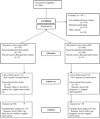A comparison of maintenance-tailored therapy (MTT) and standard behavior therapy (SBT) for the treatment of obesity
- PMID: 19695283
- PMCID: PMC2783726
- DOI: 10.1016/j.ypmed.2009.08.004
A comparison of maintenance-tailored therapy (MTT) and standard behavior therapy (SBT) for the treatment of obesity
Abstract
Objective: To evaluate a maintenance-tailored therapy (MTT) compared to standard behavior therapy (SBT) for treatment of obesity.
Main outcome measure: change in body weight.
Method: A non-blinded, randomized trial comparing effectiveness of MTT and SBT in facilitating sustained weight loss over 18 months; 213 adult volunteers> or =18 years participated. SBT had fixed behavioral goals, MTT goals varied over time. Study conducted at the University of Minnesota, School of Public Health, January 2005 through September 2007.
Results: Mean (SD) weight losses at 6, 12, and 18 months were 5.7 (5.0) kg, 8.2 (8.6) kg and 8.3 (8.9) kg for MTT and 7.4 (3.9) kg, 10.7 (8.2) kg and 9.3 (8.8) kg for SBT. Total weight loss did not differ by group at 18 months, but the time pattern differed significantly (p<0.001). The SBT group lost more weight in the first 6 months. Both groups lost similar amounts between 6 and 12 months; MTT had stable weight between 12 and 18 months, while SBT experienced significant weight gain.
Conclusions: The MTT approach produced sustained weight loss for an unusually long period of time and not achieved in previous trials of behavioral treatment for weight loss. The MTT approach, therefore, deserves further study.
Conflict of interest statement
Authors have no conflicts of interest, including specific financial interests and relationships and affiliations relevant to the subject of this manuscript.
Figures
References
-
- Block G, Hartman AM, Dresser CM, Carroll MD, Gannon J, Gardner L. A data-based approach to diet questionnaire design and testing. Am J Epidemiol. 1986;124(3):453–469. - PubMed
-
- DPP [The] Research Group. The Diabetes Prevention Program: Recruitment methods and results. Controlled Clin Trials. 2002:157–171. - PubMed
-
- Ferster CB, Nurnberger JI, Levitt EB. The control of eating. Obes Res. 1996;4:401–410. - PubMed
-
- Flegal KM, Graubard BI, Williamson DF, Gail MH. Excess deaths associated with underweight, overweight, and obesity. JAMA. 2005;293:1861–1867. - PubMed


